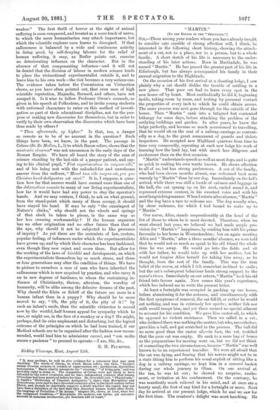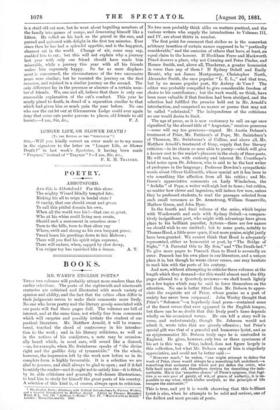"MARTIN."
[TO THE EDITOR OF THE " SpEcTATon.."]
Sia,—Those among your readers whom you have already taught to consider cats capable of strong affection will, I think, be interested in the following short history, showing the attach- ment of a cat, not to a place, nor to a person, but to a whole family. A short sketch of his life is necessary to the under- standing of his later actions. Born in Martindale, he was named "Martin." He has passed the greater part of his life in Edinburgh, but has always accompanied his family in their annual migration to the Highlands.
On the occasion of his first arrival at a shooting lodge, I saw plainly why a cat should dislike the trouble of settling in a new place. That poor cat had to learn every spot in the new house off by heart. Most methodically he did it, beginning inside, taking room by room, and testing by personal contact the properties of every inch to which he could obtain access. The same process was next gone through for the outside of the house. Then " Martin " sank into a fatigued but contented lethargy for some days, before attacking the problem of the outlying buildings and garden. In after years, he knew the lodge perfectly, and became so much accustomed to travelling, that he would sit on the seat of a railway-carriage as content- edly as a dog, to the great amazement of guards and ticket- inspectors. He accepted new Highland quarters from time to time very composedly, repeating at each new lodge his work of learning how the land lay, but with much less diligence and excitement than on the first occasion.
"Martin" understands speech as well as most dogs, and is quite as quick in making his own wants known. He shows affection to all of us, but has strong preferences. A son of the family, who had been eleven months absent, was welcomed back more warmly by "Martin" than by our dog. Immediately on the lad's arrival, while there was still a bustle of cabmen and luggage in the hall, the cat sprang up on his neck, curled round it, and expressed extreme content, in his sweetest voice and with his most languishing manner. When I return after absence, " Martin " and the dog have a race to welcome me. The dog usually wins, by sheer rudeness, for which I feel bound to make up to "Martin."
Our nurse, Alice, stands unquestionably at the head of the list of those to whom he is most devoted. Therefore, when we went abroad last year, we believed we had made ample pro- vision for " Martin's " happiness, by sending him with his prime favourite to her home in Worcestershire ; but on again meeting Alice and "Martin," after a three months' absence, we were told that he would not so much as speak to his old friend the whole time he was away. He would go into the fields and sit with her father, he would take up with her mother, but he would not forgive Alice herself for taking him away, as he thought, from the rest of the family. This was the firm belief of the nurse, at which I felt somewhat inclined to smile ; but the cat's subsequent behaviour lends strong support to the nurse's views. Immediately on our return, "Martin" took his old friend into favour again. Now comes this year's experience, which has induced me to write the present letter.
At least a fortnight was occupied in packing up our house, before abandoning it for the autumn, and simultaneously with the first symptoms of removal, the cat fell ill, or rather he would eat nothing, and was in extremely low spirits ; neither fish nor milk would tempt him, and yet there seemed no special ailment to account for his condition. We gave him castor-oil, to which he opposed no violent resistance. Then we called in a vet., who declared there was nothing the matter, but who, nevertheless, gave him a ball, and got scratched in the process. The ball did no more good than the castor oil,—in fact, the vet, testified that the poor cat was empty. He sank to a mere bag of bones as the preparations for moving went on, but we did not think of connecting the two circumstances, because "Martin" was well known to be an experienced traveller. We were all afraid that the cat was dying, and fearing that his nerves might not be in a state fitting him to perform his usual exploit of sitting like a dog in a railway carriage, we kept him in a covered basket during our whole journey to Oban. On our arrival at the inn, he was let out; he showed no surprise, excite- ment, or irritation at his confinement. On the contrary, he was manifestly much relieved in his mind, and at once ate a hearty meal, the first of any kind for a fortnight or more. Next day he arrived at our present lodge, which he and we saw for the first time. The creature's delight was most touching. He
is a staid old cat now, but he went about beguiling members of the family into games of romps, and demeaning himself like a kitten. He rolled on his back on the gravel in the sun, and purred and quivered with delight in the first ten minutes. Ever since then he has had a splendid appetite, and is the happiest, cleanest cat in the world. Change of air, some may say, enabled him to eat ; but this will not explain why a journey last year with only one friend should have made him miserable, while a journey this year with all his friends makes him supremely happy. So far as mere displace- ment is conecerned, the circumstances of the two successive years were similar; but he resented the journey on the first occasion, and rejoiced in.a similar journey on the second. The only difference lay in the presence or absence of a certain num- ber of friends. We, one and all, believe that there is only one reasonable explanation of the cat's conduct. This year he nearly pined to death, in dread of a separation similar to that which had given him so much pain the year before. No one who saw the cat let out at Glenmorven Lodge could ever again deny that some cats prefer persons to places, old friends to old































 Previous page
Previous page